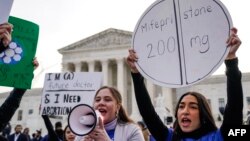The U.S. Supreme Court heard arguments Tuesday on access to the medication mifepristone, which was used in nearly two-thirds of the country’s abortions last year.
This is the court's first abortion case since it overturned the constitutional right to an abortion two years ago, after which many Republican-led states banned or restricted abortion access.
The decision on whether to limit access to the drug, expected by early summer, could have wide-reaching effects on the Food and Drug Administration's regulatory authority over drug safety. Possible limits include halting mail delivery of the medication, limiting telehealth prescription, and reducing the number of weeks into a pregnancy it can be used, from 10 to seven.
The Biden administration and New York-based Danco Laboratories, which makes mifepristone, attest that the drug is among the safest approved by the FDA.
Since 2000, over 6 million people have used mifepristone. Health care providers are concerned that unavailability or difficulty in obtaining mifepristone could lead to a reliance solely on misoprostol, another drug used as part of a medicated abortion that is less effective in terminating pregnancies on its own.
However, medical professionals and organizations opposed to abortion contend that the FDA's past easing of restrictions on obtaining the drug was unreasonable and poses a threat to women's health.
The Biden administration and pharmaceutical companies caution that a ruling limiting access to mifepristone could weaken the FDA's drug approval protocol on a broader scale, because it may encourage judicial scrutiny of the agency's scientific assessments.
The White House has been vocally in favor of abortion access.
The administration and Danco also argue that the challengers lack legal standing to sue; if the Supreme Court concurs, the case would essentially be dismissed, nullifying the appellate ruling.
The court has another abortion case on the docket, this one about whether hospitals must include abortions in emergency treatment according to a federal law, even in states that have banned them.
Some information for this report was provided by The Associated Press and Reuters.







